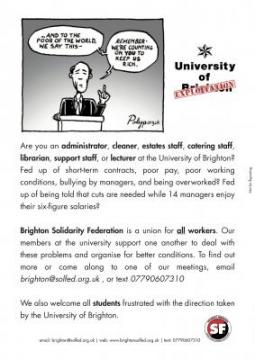Working conditions in educational institutions are becoming more and more difficult. This is often linked to managers making cuts, establishing austerity measures, or asking all workers to do more for less. We currently organise as a network of workers at University of Brighton, and have links to other educational institutions.
We aim to organise to improve these conditions on a day-to-day basis, trying to fight winnable disputes for caretakers, cleaners and hourly-paid lecturers alike. To resist the ways that these institutions are attacking the working conditions of all staff means working together, not establishing boundaries between academic and non-academic staff.
Practical modes of organising in the first place might include getting together with fellow workers to discuss what specific problems there are. Do you have the correct equipment? Is there a problem with overtime? Has there been extra responsibility added to your role without recognition of this? Getting together and talking about these things can help you to work out what a common target might be. For instance, office workers could consider whether their working environment meets health and safety conditions; hourly paid and fractional lecturers can insist on collective rather than individual meetings to discuss teaching allocation, and so on.
The university is trying to exploit its most vulnerable and precarious staff. The first step in stopping them doing this is small efforts of solidarity. If you’re interested in helping to organise, there are some resources and further information below. We also meet up once a month to discuss our situations at work and how we can best support one another with these. If you'd like to start coming along, fill out the contact form below to get in touch with us.
The office environment is often unhealthy and sometimes unsafe, especially if you don’t know what legal rights you have.
This pamphlet, collated by Bristol Soldarity Federation, offers a simple, easy to understand rundown of your rights, from general laws to specifics around the office environment.
A handy jargon buster is included along with helpful tips for dealing with common problems like RSI, eye strain and stress.
And the final section is possibly the most important of all — looking at how we can organise collectively to make our work permanently safer and healthier.
Struggling? You aren’t alone.
Cleaners have a vital role in society, yet their job is poorly paid and routinely dismissed as a job carried out mainly by women to earn a bit of extra cash. Cleaning is also not generally seen as a particularly physically hard or dangerous job. Most people see cleaning as involving a bit of dusting, mopping and hoovering.
Written by a cleaner, this pamphlet draws on research from across the world to show the reality of cleaning and the impact the job has on the health and wellbeing of cleaners. The pamphlet not only examines the more obvious aspects of the job that affect cleaners’ health, such as the physical demands of the job and the effects of cleaning chemicals, but also takes into account the detrimental impact of factors such as low pay, ever-increasing workloads, low status, sexual harassment and family commitments on the everyday lives of cleaners. In doing so, the pamphlet exposes the true cost being paid by cleaners and their families for job that is central to the wellbeing of society as a whole.
As such, this pamphlet is not only essential reading for cleaners but for all those interested in seeing greater justice for one of the most exploited and marginalised groups of workers.
The stuff your sexist boss doesn't want you to know
Sexism is a constant presence in many workplaces where it can take many forms. From lower pay, to expectations of unpaid work, to sexual harassment by bosses, other workers or customers, sexism means women and workers seen as women are treated unequally on the basis of sex or gender. Our new pamphlet looks at the reality of sexism in the workplace and what we can do about it.
As anarcho-syndicalists we favour direct, collective strategies that build and maintain a culture of resistance in the workplace. While it’s not always possible to directly confront sexism at work, there is still much that can be done to make work more bearable and undermine sexist behaviour. Coping strategies can allow workers to deal with things on a personal level while tactics of resistance can help you to actively fight against unequal treatment, objectification, harassment and structural disadvantage. In this way workers can organise and fightback, building a culture of solidarity and support at work, which ultimately means you and others experiencing sexism are less isolated and more likely to win.
Hourly paid and fractional work is common at Brighton, as is being told your teaching at the last minute, being given no resources to support you with teaching entire modules, being underpaid, not being paid over the summer - the list goes on. Whilst the situation can be difficult, lecturers can take small but significant actions to improve it, such as accompanying one another to meetings, insisting on collective meetings, sharing information about administrative processes for claiming and organising with other workers at the university for better conditions. This document has information that will hopefully be useful for helping lecturers to navigate hourly paid and fractional work.
